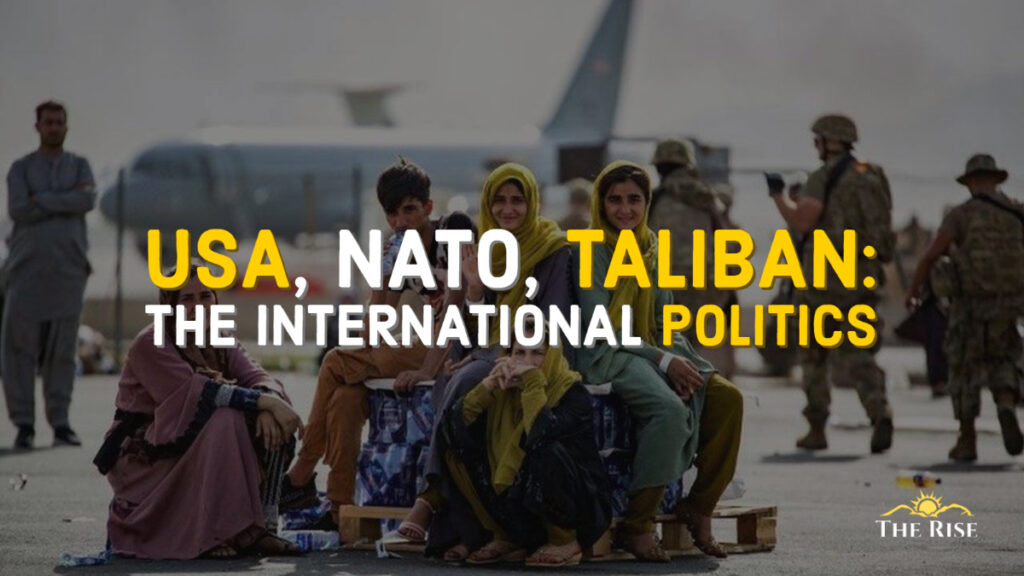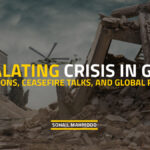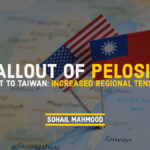Published: August 29, 2021 | Updated: August 31, 2021
So far, no government has recognized the Taliban as the official government of Afghanistan. The US is no more a global hegemon. It has declined relative to other powers, like China. The US and NATO must, thus, prefer acting pragmatically rather than ideologically. Convergence of national interests of the US and Pakistan in stabilizing Afghanistan may improve their relations. Meanwhile, Biden must stay the course and completely pull out American military forces by the August 31 deadline.
On August 30, 2021, Gen McKenzie, commander of US Central Command, declared the war in Afghanistan over. America had managed to evacuate some 123,000 civilians from Kabul, including 6,000 American citizens, from Kabul since August 14. Today, the Taliban rule Afghanistan once again after a two-decade long wait. The war had a high cost. This longest-drawn American war cost the loves of some 2,461 US soldiers and civilians. Some 13 soldiers were killed by an ISIS-K suicide bomber just last week.
Meanwhile, thousands of people who were eligible to be brought to the US and NATO allies have been left behind. the UN Security Council has passed a resolution on August 30, 2021 emphasizing that it expects the Taliban to keep its promises to let people leave. It also laid out in broad terms expectations on counterterrorism, human rights, and humanitarian access from the Taliban.
Earlier, In July 2021, President Biden had decided to withdraw the US forces by August 31, 2021. He had also assured that it was “highly unlikely” that the Taliban would be successful in overrunning everything and owning the whole country. Much to the surprise of everyone, on August 15, 2021, Afghanistan’s Ghani government collapsed, and the Taliban took over control of Kabul. The fall of Kabul to the Taliban was expected, albeit much later. Soon, the US had hit upon “an uneasy truce” with the Taliban and started the largest airlift in history.
Meanwhile, President Biden was facing strong criticism at home and abroad for the chaos surrounding the troop withdrawal that led to the Taliban’s sudden advance to Kabul. It was said that the “unforeseen catastrophe” has diminished President Biden’s domestic reputation and U.S.’s standing abroad. The allies of the U.S. now felt “blindsided”.
Since July, the US and NATO had been evacuating their citizens and the Afghans who had worked for them. However, by the third week of August 2021, the Afghanistan evacuation operation had speeded up. By August 24, 2021, the US and NATO, had evacuated nearly 59,000 people out of Kabul. Meanwhile, there were reports of threats to Kabul airport by ISIS in Khorasan, known as ISIS-K. By August 25, 2021, the US intelligence agencies were near-certain that an attack was imminent outside Kabul airport, triggering a warning to American citizens to leave the area immediately.
Most importantly, the Biden administration remained in constant contact with the Taliban regime on security matters. The CIA director, Bill Burns had met with Taliban leader Abdul Ghani Baradar. Burns is the highest-ranking US official to meet in person with the new Taliban regime in Afghanistan. The Taliban had made it clear that August 31, 2021 remained the deadline for evacuation. Although President Biden had decided to stick to the August 31 deadline for withdrawing troops from Afghanistan, he had also asked for Plan B in case it is needed. It was said that the extension of date, if inexorable, would be very brief and focused only on evacuating Americans. Like the US, the other G7 powers had also agreed to engage with the Taliban as they sought safe passage for those who want to leave the country. Earlier, US allies had warned that they would not be able to complete the whole evacuation operation before the August 31 deadline. What they meant was that all Afghans couldn’t be evacuated. As expected, the evacuation of NATO citizens and permanent residents (Green Card holders) was the highest priority. The US and NATO were challenged to meet their commitment to Afghans desperately wanting to leave the country. Many had predicted that not all will be able to do so by the August 31 deadline.
Kabul Airport Blasts and Implications
In a horrific terrorist attack at the Kabul airport on August 26, 2021, some 13 US soldiers and at least 170 others were killed. The ISIS-K claimed the suicide attack and the Biden administration agreed its likelihood. The attack was one of the deadliest in nearly two decades since the US-led invasion. American officials believe that another terror attack in Kabul is likely.
As expected, on August 26, 2021, President Joe Biden vowed to retaliate for the terrorist attack. On August 27, 2021, the US military carried out a drone strike against an ISIS-K planner in Afghanistan’s eastern Nangarhar province. There were more warnings of possible further terror attacks targeting the evacuation effort from Kabul. Hence, the US Embassy in Kabul again warned the US citizens, on August 27, 2021, to leave the Kabul airport immediately citing security threats. Despite the attacks, the US military resumed evacuation flights, and by the end of August 27, 2021, some 12,500 people had been evacuated from Afghanistan in 24 hours.
As of August 28, 2021, the desperate mission to airlift US citizens and Afghans from Afghanistan by the deadline, is now in its final phase. The US and other Western countries have been racing against time to evacuate their citizens and Afghan allies ahead of the deadline. The US is still planning on ending the mission before the August 31 deadline. Its allies, too, are concluding their evacuations now. The last UK civilian and military flights flew out of Afghanistan on August 28, 2021. However, hundreds of people who were eligible to be brought to the UK have been left behind. Earlier, France had announced the end of its evacuation efforts on August 27, 2021 but vowed to “stand by the Afghan people” after August 31. The country had evacuated nearly 3,000 people since August 15, 2021. An extra 1,500 Afghans who had worked for France were evacuated before August 15. Italy’s Defence Ministry also said on August 27, 2021, that it had concluded its military evacuations of Afghan nationals out of Kabul. According to the ministry, a total of 5,011 people have been evacuated out of Afghanistan since June 2021, of whom 4,980 were Afghan citizens. Australia, New Zealand, Sweden, Belgium, the Netherlands, Poland, Turkey, and Spain have all said their evacuation missions ended on August 27, 2021.
To be fair, despite a botched exit strategy, President Biden is only acting in the larger national interests of the US. Meanwhile, the politics of the exit strategy has become complex, to say the least.
By August 28, 2021, about 1,11,000 people had been evacuated. President Biden issued warnings on August 28, 2021, of another terrorist attack in Kabul. American forces then launched a drone strike in Kabul on August 29 that killed a suicide car bomber suspected of preparing to attack the airport. Later, it was disclosed that the operation had killed up to 10 civilians. The Taliban on August 29, 2021 condemned the US drone strike. However, the hectic evacuation continued under constant threat of further attacks.[4] On August 30, the U.S. anti-missile defenses intercepted as many as five rockets that were fired at Kabul’s airport by ISIS-K.
It is widely agreed that some US citizens and many thousands of Afghans will remain in Afghanistan after the deadline expires. The luck of these people shall remain acutely unclear and can be a blemish on the legacy of President Biden.
Also Read: Afghanistan: A New Opportunity for the Quad?
On the immediate implications of the hasty withdrawal from Afghanistan, David Smith argues, “The debacle has drawn the harshest rebukes of his seven-month presidency, with some Republicans demanding his impeachment or resignation. Trump called the retreat from Afghanistan “the single greatest humiliation in our history”. Congresswoman Elise Stefanik insisted that Biden had “blood on his hands”...Other western nations rapidly wound down evacuation efforts after the bombing. For allies, there is a bitter disappointment: Biden had been seen as a steady hand who could restore US leadership on the world stage. Scathing comments expressed at a recent session of the British parliament made clear how faith in American hegemony has been shaken. Some observers have been puzzled that Biden’s much-vaunted empathy, displayed for American troops, has been less copious for Afghan women and girls now at the mercy of the Taliban and that a man steeped in foreign policy has unapologetically interests. Biden’s popularity has taken a hit, dipping below 50% for the first time in opinion polls…. It is far from certain that he will suffer long-term damage for ending a war that had become profoundly unpopular.”
To be fair, despite a botched exit strategy, President Biden is only acting in the larger national interests of the US. President Biden is only doing what is desired by a vast majority of American people. There is ample evidence suggesting that Americans back the withdrawal from Afghanistan. A CBS News/YouGov survey taken on August 18-20 , 2021 had discovered that while 63% of adults supported the decision to withdraw troops from Afghanistan, 70% thought the exit “should have been handled better”. Another ABC News/Ipsos poll conducted Aug. 27-28, 2021 had discovered that 84% of adults believed the US military “should stay in Afghanistan until all Americans have been evacuated”, and 71% said, “ the troops should remain until all Afghans who aided the U.S. have been evacuated”. The survey found 59% of adults disapproved of President Biden’s running of Afghanistan while 38% approved down from 55% who approved in a late July 2021 poll.
Undoubtedly, Americans bemoan the messy exit from the country. Catherine Lucey and Joshua Jamerson In their article “Americans Back Afghanistan Withdrawal, Lament Chaotic Exit”, published in The Wall Street Journal, August 30, 2021, argue that:
“The mixed feelings of many Americans as they follow what has quickly become the greatest foreign-policy challenge of Mr. Biden’s presidency…broad support for leaving Afghanistan, but more mixed views on the exit itself. …Many are grappling with how much to hold President Biden responsible for the bloodshed as U.S. troops end a 20-year occupation.”
Meanwhile, the politics of the exit strategy has become complex, to say the least.
The US is no more a global hegemon. It has declined relative to other powers, like China. The US and NATO must, thus, prefer acting pragmatically rather than ideologically.
Recognition: Taliban or the ‘Islamic Emirate of Afghanistan’?
Another issue critical to the future of Afghanistan is its recognition. So far, no government has recognized the Taliban as the official government of Afghanistan. Doing so could allow the country access to previously committed foreign aid. Most importantly, China and Russia have also been in contact with the Taliban. As expected, a de facto recognition of the ‘Afghanistan Emirate’ by the US has already happened. The de jure recognition is problematic. However, President Biden has indicated that he wants to see tough conditions applied to the Taliban regime, especially in how they treat women, before recognizing the Islamic Emirate as legitimate.
However, it would be advisable to have a minimalist approach to recognition instead of a maximalist one. It is pertinent to remember that the Western notions of human rights are not universal and there are many who have different understandings of how best to organize societies. More importantly, the US is no more the global hegemon and there is nothing exceptional about it. The world has changed, and the US has lost its standing in the world. The US has declined relative to other powers like China. Therefore, pressure on the Taliban can backfire as they will go on a defiance mode. The Taliban will be supported by China, Russia, Iran, Pakistan, Turkey, and Qatar. It is in no one’s interest to have a disintegration of Afghanistan and another era of civil strife and regional conflict. The US and NATO must, now, prefer acting pragmatically rather than ideologically.
If recognition is withheld, the ‘Emirate’ may collapse because of economic breakdown and humanitarian crisis. The breakdown may have a spillover effect on the region and will create space for the rise of future terror threats.
Given the condition of their victory and their cultural background, the Taliban cannot give all assurances desired by the US and NATO as regards upholding human rights in the country. They will compromise somewhat, but will largely stick to their Islamic legacy, no matter what the US and NATO desire. If recognition is withheld, the Emirate may collapse because of economic breakdown and humanitarian crisis. The breakdown of the Emirate will have a spillover effect on the region and will create the space for the rise of future terror threats. For this reason, it is advisable that it be recognized by the world and immediate humanitarian assistance be forthcoming. A complete collapse of the Emirate is in no one’s national interest.
You May Like: Afghanistan Surge: Taliban at the Door of Kabul As US Troops Withdraw
Improvement in US-Pakistan Relations?
Pragmatism requires that the Taliban be accommodated (somewhat) and be given a chance to establish their ‘Islamic Emirate of Afghanistan’. Much depends on the Biden administration to chart a new foreign policy and a global reset of the American power. The key to securing Afghanistan is for the Biden administration to mend relations with Pakistan with which it has a very strained relationship at present. Given the support that Pakistan gave to the Taliban in the past twenty years, the trust deficit between the US and Pakistan is remarkably high. However, the two countries are most likely to cooperate at a certain level to bring peace and stability in Afghanistan.
Perceptions matter in the conduct of international relations. The US and NATO have been humiliated in Afghanistan. Today, most Pakistanis are very upbeat about Afghanistan. It is widely perceived that Pakistan has gained the most from developments in the neighbouring country. Also, its rival, India, has lost considerably because it, perhaps, put all its eggs in President Ghani’s basket and lost when he fled the country as the Taliban took over Kabul.
The ISIS-K threat in Afghanistan has made the US much more reliant on Pakistan than ever before. The US is seeking to mend its relationship with Pakistan. As expected, Pakistan is cooperating with the US at a certain level. Pakistan’s Chief of Army Staff General Qamar Javed Bajwa reiterated on August 27, 2021, that Pakistan had no favourites in Afghanistan. He said this to US chargé d’affaires Angela Ageler. The two discussed the evolving situation in Afghanistan during the meeting. The US diplomat praised Pakistan’s efforts in promoting regional peace and stability and thanked the army chief for the special assistance in the evacuation operations from Kabul.
Given the support that Pakistan gave to the Taliban in the past twenty years, the trust deficit between the US and Pakistan is remarkably high. However, the two countries are most likely to cooperate at a certain level to bring peace and stability in Afghanistan.
Lindsey Graham, an influential Republican senator, said on August 28, 2021 that any “sustainable solution” in Afghanistan must include Pakistan. Acknowledging that the region is “very complicated”, and these are “dangerous times”, Graham emphasized that Pakistan is a “nuclear-armed nation”, and that it has its own version of the Taliban who wish to “topple the Pakistani government and military”. The lawmaker further appreciated the efforts of the Pakistani government in assisting with the evacuation of US citizens, allies, and other nations from Kabul after the Taliban takeover.
Also Read: A New Withdrawal Playbook: US-Afghanistan and Implications for India
Earlier, in June, Graham had expressed his surprise at President Biden’s decision of not including Pakistan in the strategy for withdrawal of American troops from Afghanistan, warning that ignoring Islamabad could be disastrous. In a meeting earlier this year between Foreign Minister Shah Mehmood Qureshi and the US lawmaker, Qureshi said that Pakistan wanted to forge closer economic and trade linkages with the United States. Qureshi had said that Pakistan would continue to support efforts for achieving an inclusive political settlement in Afghanistan that would lead to a comprehensive ceasefire. He stressed that peace in Afghanistan was ultimately the shared responsibility of all Afghan parties as well as key international stakeholders. Senator Graham had appreciated Pakistan’s support for deepening the peace process in Afghanistan while underscoring the importance of economic engagement between the US and Pakistan in fostering regional peace and stability.
It can be safely predicted that Pakistan’s relations with the US will improve in the foreseeable future. There is a convergence of national interest in making sure that Afghanistan remains peaceful, secure, and stable. Therefore, both countries will cooperate to ensure that it happens.
ISIS-K, Taliban, and the US: Path Forward
President Biden is right in staying the course in Afghanistan. Despite the horrific attack and loss of American lives, the US and Taliban are somehow allying now. The US doesn’t blame the Taliban for the Kabul airport attack. They will cooperate further given the certainty of future ISIS-K attacks. The Taliban have met their part of the Doha February 2020 peace deal and are certain to do so until the deadline of August 31. This much can be guaranteed. It is also very likely that the US will not use massive military force against the ISIS-K terrorists in the next few days as it doesn’t want to sabotage the new working relationship with the Taliban rulers. In the future, limited kinetic operations by the US against ISIS-K will occur with the tacit approval of the Taliban.
The total number of ISIS-K fighters is estimated to be only a few hundred. However, future suicide attack threats are very real and are quite worrisome as they can’t be prevented as such. Therefore, the Taliban need help to bolster their internal security. Most likely, Pakistan will assist the Taliban in this important quest. Most importantly, the ‘Jihadist‘ mindset of the ISIS-K cannot be easily ended. Given the powerful ‘Jihadist‘ legacy and radical Islamic ideology, this shall remain a big challenge for not only Afghanistan but also the neighbouring Muslim counties, especially Pakistan. According to this thinking, the crusade of Islam against Western oppression and Kufr (Unbelievers) is a fundamental postulate of the ‘Jihadists‘. This is the common thread of Islamic fundamentalist movements. The adherents of this radical ideology believe that only a Jihad can end the rule of Kufr and thereby establish Islamic rule. The Taliban are no angels although they are considerably moderate now, as compared to the ISIS-K entity.
Most troubling to the region’s governments is that the adherents of the very extreme ideology of the ISIS-K believe in bringing down the governments of neighbouring states to establish their version of the Islamic caliphate. A jihad against foreign lackeys is another fundamental postulate of this thinking. More importantly, the Jihad stretches beyond West Asia into China and ‘Russia proper’. Remember, the Taliban was never a global jihadist entity, not even a regional one. They were and are limited to Afghanistan only. They shall remain an Afghanistan phenomenon in the future too. The local nature of the Taliban forbids them to wage all-out military action against the likes of the Tehrik-I Taliban Pakistan, al-Qaeda, and even the ISIS-K. The tradition of war in Afghanistan is first to neutralize the enemy through a negotiated settlement. Throughout history, enemies have settled disputes through such negotiated settlements. Fighters have even frequently switched sides in such negotiations. Therefore, to expect that the new Taliban government will at once take up arms against such entities is a mistake.
Also Read: Beginning of a new Cold War
Prudence requires that massive force not be used by the US against the ISIS-K because of the possibility of the loss of innocent civilian lives, often termed as collateral damage. Hundreds of thousands of Afghans have lost their lives in the last half-century of permanent war. The proper manner of tackling the ISIS-K threat would be to adopt the regional approach. The US and NATO must initiate a working relationship with Pakistan, Iran, Uzbekistan, Tajikistan, Turkmenistan, China, and Russia to have a comprehensive security arrangement for Afghanistan. Humanitarian assistance must be immediately forthcoming. Already, Germany has announced humanitarian aid to the beleaguered and hapless citizens of Afghanistan. More aid must be forthcoming and soon enough as the country struggles to open a new chapter in its tragic history.
President Biden must stay the course and completely pull out American military forces by the August 31 deadline. Meanwhile, the opponents of President Biden are criticizing him vehemently.
Senator Lindsey Graham condemned President Biden for withdrawing US troops from Afghanistan, saying on August 29, 2021 that the likelihood of another terrorist attack like 9/11 “just went through the roof.” He said that:
“We’re leaving thousands of Afghan allies behind who fought bravely with us. We’re gonna leave hundreds of American citizens behind…he would not have withdrawn forces in the first place, instead opting to maintain a presence in Afghanistan working with “indigenous forces. These drone attacks will not degrade ISIS. The number of ISIS fighters have doubled. We’ve turned our back on our allies… And we set the conditions for another 9/11… I’ve never been more worried about an attack on our homeland than I am right now…For the next 20 years, American presidents will be dealing with this catastrophe in Afghanistan…This war has not ended. We’ve entered into a new deadly chapter. Terrorists are now in charge of Afghanistan…. Biden shouldn’t recognize the Taliban as a legitimate governing body of Afghanistan because it would encourage other terrorist organizations to follow the Taliban’s lead. Do not legitimize the Taliban. Do not recognize them because if you do, you’re going to put Americans at risk all over the world because other terrorist organizations will say how the best way to get America’s attention and legitimacy is to kidnap some Americans or people who fought with America…he believes Biden should be impeached for “dereliction of duty.”
Biden’s opponents, especially in the Republican party, are waging a relentless attack against him now. This is unwarranted and is only the usual politics in a divided America. Such is the nature of the American political system that partisan politics is a permanent affair, largely because of the continuous cycle of elections. This is expected and can be ignored. However, a bipartisan commission must be formed, like the 9/11 commission, to ascertain the mistakes of the twenty-year Afghan war. Arguably, the whole Afghan war project was a colossal mistake on the part of the American leadership. However, the more significant thing is to focus on the August 31 deadline now. It bears repetition that President Biden was right in withdrawing the American military force and in partnering with the Taliban to make the exit possible.
Given the nature of the suicide attacks, the incident at the airport was a tragedy that could hardly be prevented. It is an immense tragedy. Hopefully, the exit of Western forces will now be completed without further loss. Overall, President Biden is proving to be a capable leader. Later, a rethink of America’s West Asia policy must happen. It is time to recognize the Islamic Republic of Iran and return to the JCPOA – the Iranian nuclear deal. Also, the recognition of the Islamic emirate must happen sooner, than later. Only such actions can bring peace and stability to Afghanistan. The hapless people of Afghanistan deserve better, mind you.
Disclaimer: The views expressed in this article are of the author solely. TheRise.co.in neither endorses nor is responsible for them.
About the author
Sohail Mahmood is an independent global affairs analyst and the author of several books, monographs, and research articles on the Middle East and South Asian politics, governance, and development issues. He has taught for about 30 years in various universities of Pakistan and the US and has worked as a consultant for the World Bank, CIDA, SDC, IUCN, and UNDP. Sohail lives in Chapel Hill, North Carolina, United States.






















Very good analysis with deep insight into the Afghan issue.
An excellent write up on a very complex situation. Dr Sohail has treaded into an area where many writers still feel quite uncertain and abstain from giving opinion. At the moment situation is quite brittle, precarious and unpredictable. That’s why I was impressed with the ease and clarity of Dr Sohail. I urge him to please keep reflecting and writing, particularly on such regional developments globally. Thanks and all the best.
Pingback: In Search of Allies: Washington and the World - TheRise.co.in
Pingback: Lessons for Taiwan from Russia-Ukraine Conflict - TheRise.co.in